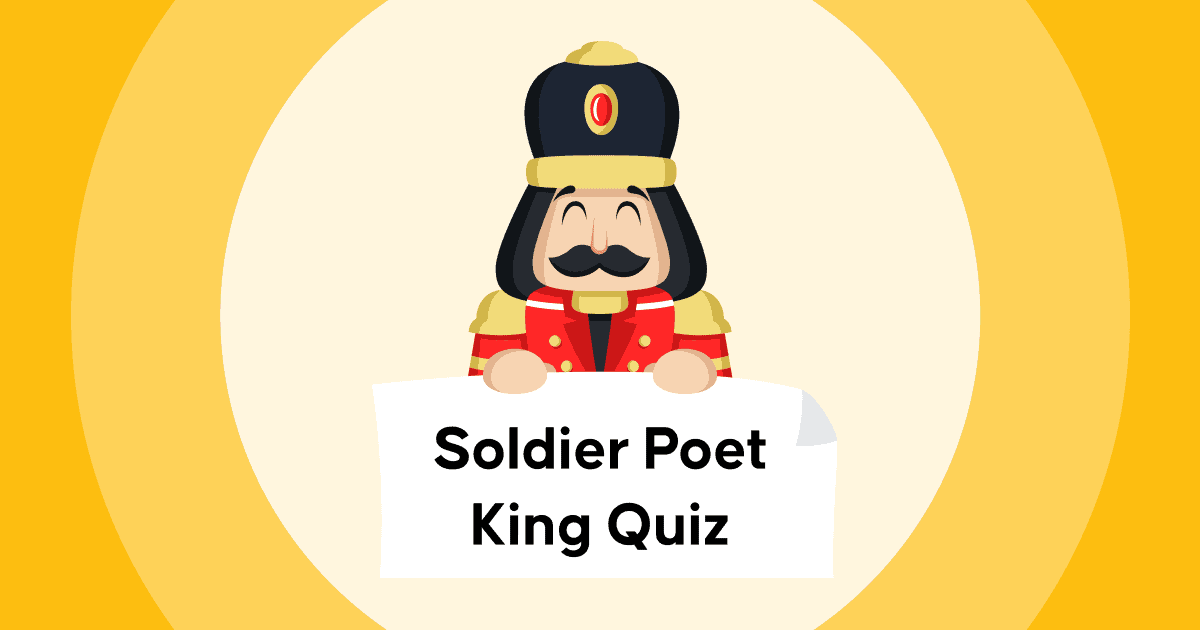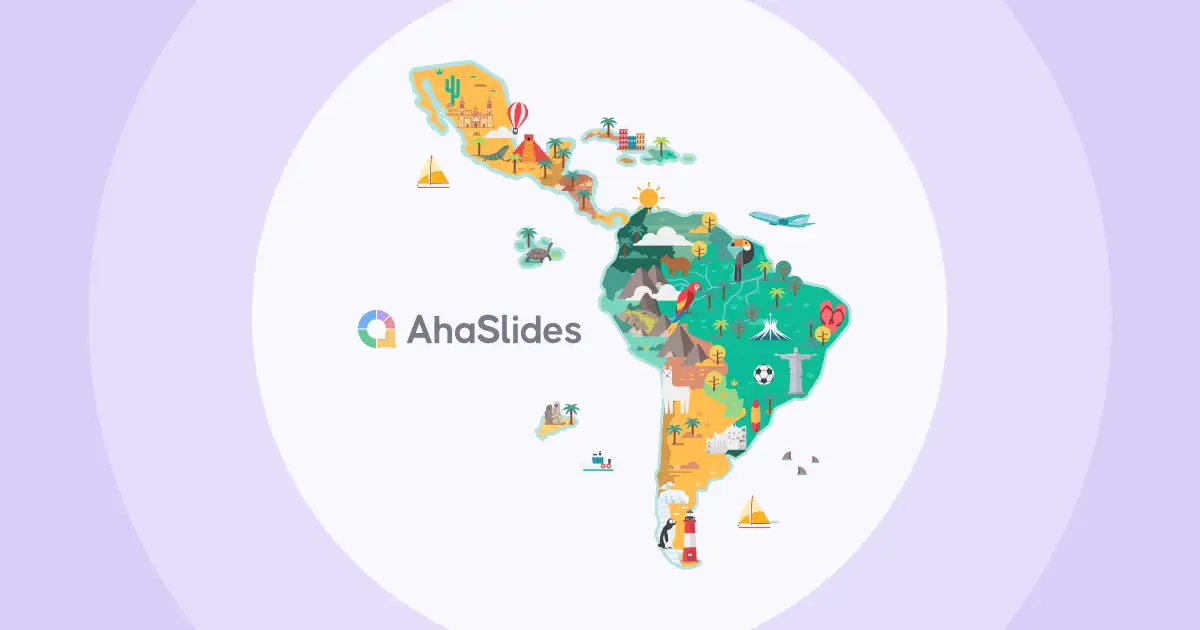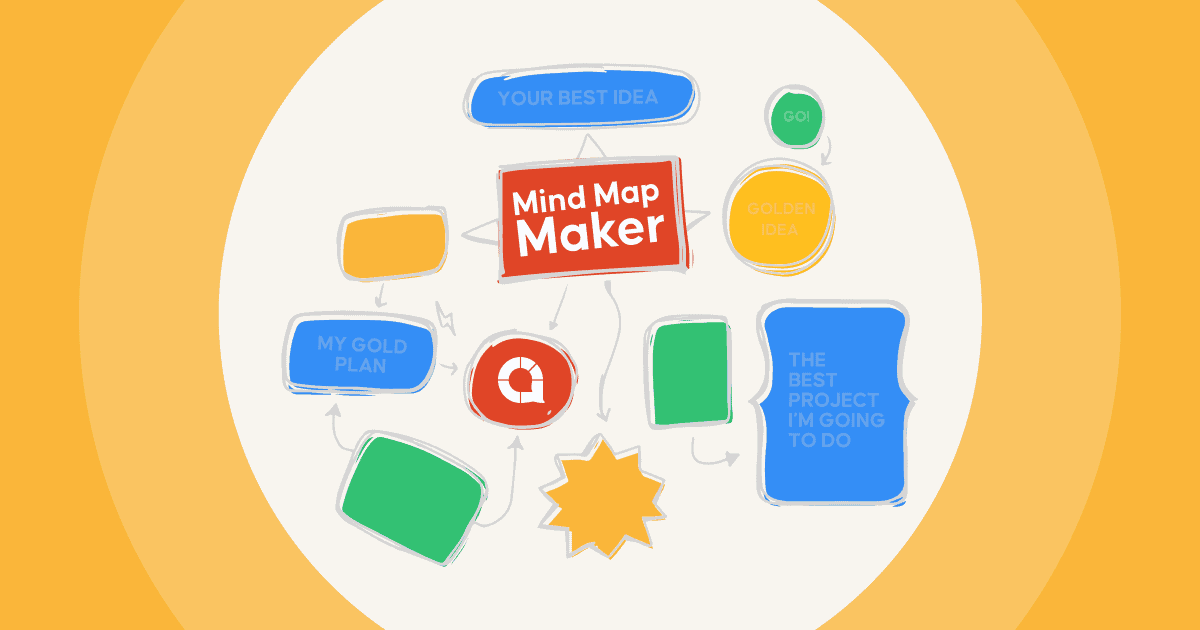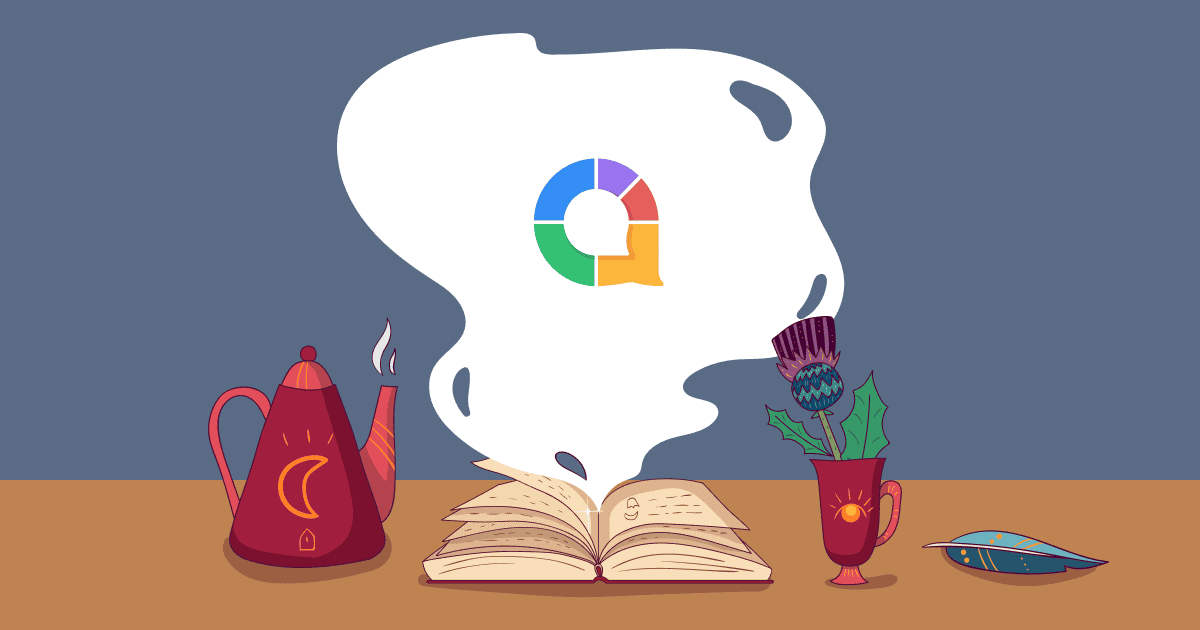A kii ṣe Alejò Nitootọ jẹ ere ti isọdọkan lati ṣe oruka ere ere ẹdun kan ni alẹ tabi mu ṣiṣẹ pẹlu awọn ololufẹ rẹ lati mu ibatan rẹ jinlẹ, ati pe a ni atokọ ni kikun fun ọ lati lo fun ỌFẸ ni isalẹ!
Eyi jẹ ere ipele mẹta ti a ṣe daradara ti o ni wiwa gbogbo awọn ẹya ti ibaṣepọ, awọn tọkọtaya, ifẹ ti ara ẹni, ọrẹ, ati ẹbi. Gbadun irin-ajo ti jinle awọn asopọ rẹ!

TL; DR
- Ere “A kii ṣe Alejò Nitootọ” (WNRS) kii ṣe deki awọn ibeere nikan; o ṣẹda awọn iriri ti o nilari fun awọn ibaraẹnisọrọ ti o jinlẹ ati awọn ifunmọ to lagbara.
- Ọmọ-ọpọlọ ti WNRS jẹ Koreen Odiney, awoṣe ti o da lori Los Angeles ati olorin ti o nifẹ lati ṣẹda awọn asopọ ododo ati tootọ.
- Eto ere naa pẹlu awọn ibeere ipele-3, pẹlu Iro, Asopọ, ati Irisi. Ọpọlọpọ awọn atẹjade afikun tabi awọn akopọ imugboroja lati ṣaajo si awọn ibatan kan pato, gẹgẹbi awọn tọkọtaya, ẹbi, tabi awọn ọrẹ.
- Imọ ti o wa lẹhin awọn ibeere WNRS jẹ ibatan si ṣiṣe awọn ibeere ti o tọ ati awọn ilana imọ-jinlẹ bii Imọ-jinlẹ ẹdun (EQ), aibalẹ awujọ, ati ilera ọpọlọ.
- Wọle si awọn ibeere WNRS ẹya ọfẹ tabi awọn kaadi deki ti ara lori oju opo wẹẹbu osise ti ami iyasọtọ, awọn ti o ntaa ẹnikẹta miiran tabi awọn ọja ori ayelujara.
Tabili ti akoonu
Kí ni “A Kìí Ṣe Àjèjì Ní Ti gidi”?
Ninu agbaye ti ọpọlọpọ awọn ibaraẹnisọrọ ina, ere A kii ṣe Awọn ajeji Gaan duro jade bi irin-ajo sinu awọn asopọ jinna. Ko ṣe atunṣe bi a ṣe nṣere awọn ere, ṣugbọn tun ṣe atunṣe daradara bi a ṣe sopọ pẹlu awọn omiiran ati ara wa.
Nitorinaa, kini ipilẹṣẹ ati imọran rẹ?
Eleda ti WNRS ni Koreen Odiney, awoṣe ati olorin ni Los Angeles. Gbólóhùn náà “A Kì í Ṣe Àjèjì Ní Ti gidi” wá láti ọ̀dọ̀ àjèjì kan tí ó bá pàdé lákòókò àwọn àkókò fọ́tò rẹ̀. Ere kaadi nigbana ni a bi lati inu ifẹkufẹ rẹ fun fifọ awọn idena ati didan awọn asopọ ti o nilari.
Ere naa pẹlu ọpọlọpọ awọn ibeere imunibinu ni awọn ipele ilọsiwaju 3: Iro, Asopọ, ati Itupalẹ. Awọn atẹjade pataki kan wa tabi awọn idii imugboroja gẹgẹbi awọn tọkọtaya, ẹbi, ati ọrẹ fun iriri ti o tobi julọ ti ibaramu.
Kini idi ti WNRS jẹ diẹ sii ju Ere Kaadi kan lọ?
Dipo aifọwọyi lori idije, ere naa ṣẹda aaye ti o nilari ati iriri. Pẹlu orisirisi laniiyan a kìí ṣe àjèjì gan-an awọn ibeere, o maa tẹsiwaju si agbaye ti iṣawari ti ara ẹni ati awọn asopọ ododo.
Aami naa tun ṣe apẹrẹ kaadi ti o kẹhin fun awọn oṣere lati kọ awọn ifiranṣẹ si ara wọn, ti o ṣafikun ipa pipẹ.
Bii O Ṣe Di Aibalẹ Agbaye
Ṣeun si ọna alailẹgbẹ ti asopọ gidi, ere naa ni ipa ti gbogun ti. O jinna jinna pẹlu awọn olugbo ti n wa ododo ni agbaye oni-nọmba kan pẹlu ibaraenisọrọ awujọ ti o dinku.
Pẹlupẹlu, agbara ti Ọrọ-ti-Ẹnu ati akoonu media media siwaju jẹ ki o gbogun ti yarayara bi iṣẹlẹ agbaye. Aami naa tun nfunni ni ọpọlọpọ awọn ẹda tabi awọn akopọ akori lati ṣaajo si awọn oriṣi awọn ibatan lọpọlọpọ fun iriri itelorun.
Bii o ṣe le ṣere “A kii ṣe Alejò Nitootọ”
Ṣetan lati fọ awọn idena ati immerse ni awọn ibatan tootọ? Jẹ ki a ṣawari awọn igbesẹ ti o rọrun lati mu ṣiṣẹ “A kii ṣe Alejò Nitootọ”!
1. Ere Oṣo ati Awọn ohun elo ti a beere
Iwọ yoo nilo awọn ohun elo isalẹ lati ṣeto awọn ere:
- Awọn kaadi kaadi “A kii ṣe Alejò Nitootọ” pẹlu gbogbo awọn ipele 3-ibeere. O le lo awọn idii imugboroja lati ṣe deede si awọn olugbo ibi-afẹde ti o yẹ.
- Ikọwe ati iwe akọsilẹ fun iṣẹ ṣiṣe ikẹhin ti iṣaro tabi kikọ awọn ifiranṣẹ si ara wọn.
- Aaye ti o dara ati idakẹjẹ fun gbogbo awọn olukopa lati ni itunu pinpin awọn ero wọn
Lẹhin ti o ni awọn ohun elo gbọdọ-ni, dapọ ọkọọkan awọn deki kaadi ki o si fi wọn si isalẹ ni awọn akopọ lọtọ. Maṣe gbagbe lati fi kaadi ipari si apakan fun lilo ni ipari ere naa.
Nipa awọn olukopa, o le ni rọọrun bẹrẹ ere pẹlu awọn oṣere meji. Tani yoo kọkọ bẹrẹ? Pinnu nipa wiwo ara wọn; akọkọ eniyan lati seju bẹrẹ! O le ṣere pẹlu awọn ọrẹ, ẹbi, tabi paapaa awọn alejo. Jọwọ ṣe akiyesi daradara pe awọn oṣere ni iwuri lati pin ni gbangba ati ni otitọ.
2. Loye Awọn ipele & Awọn iru ibeere
Bayi o to akoko lati loye awọn ipele ere! Ni deede awọn ipele mẹta ti awọn ibeere wa lati jinlẹ ere ni ilọsiwaju:
- Ipele 1: Iro - Fojusi lori fifọ yinyin, ṣiṣe awọn arosinu, ati ṣawari awọn iwunilori akọkọ
- Ipele 2: Asopọ - Ṣe iwuri fun pinpin ti ara ẹni, awọn iwo aye ati awọn ẹdun
- Ipele 3: Iṣiro - Ṣe igbega iṣaro jinlẹ lori iriri ti ẹrọ orin ati awọn miiran nipasẹ ere naa.
3. Bi o ṣe le jẹ ki ere naa di diẹ sii
Tẹsiwaju lati ṣawari awọn imọran to wulo lati ṣe ipele iriri WNRS rẹ. Kilode ti o ko ro diẹ ninu awọn imọran wọnyi?
Ṣọra ti ṣiṣẹda aaye itunu ati ailewu. Afẹfẹ ti ko ni idajọ pẹlu awọn abẹla, awọn ipanu, ati orin jẹ ki awọn oṣere ni itunu lati ṣii.
Maṣe yara! Jẹ ki ibaraẹnisọrọ lọ nipa ti ara. Gba akoko rẹ pẹlu ibeere kọọkan ki o tẹtisi ni itara pẹlu iwulo tootọ.
O le lo WildCards pẹlu ọpọlọpọ awọn italaya ẹda lati ṣafikun ifọwọkan agbara si ere naa.
4. Ti ndun Fere la Ni-Eniyan
Iyalẹnu bi o ṣe le mu awọn ere WNRS ṣiṣẹ ni awọn eto oriṣiriṣi? Maṣe foju apakan yii! Lootọ, o le ṣere ni eniyan tabi fẹrẹẹ laisi adehun.
- Idaraya ninu eniyan: Awọn deki ti ara jẹ apẹrẹ fun ipele ti iriri naa. Awọn ibaraẹnisọrọ ti awọn eniyan taara diẹ sii bi ede ara ati oju olubasọrọ nfa ipa ẹdun diẹ sii. Kó awọn ẹrọ orin ni ayika kan tabili ki o si bẹrẹ awọn ere bi bošewa ofin!
- Iṣere fojuhan: Mu WNRS ṣiṣẹ lori ayelujara ṣiṣẹ daradara nipasẹ awọn ipe fidio bii Sun-un tabi Facetime fun awọn ọrẹ jijin tabi awọn ọmọ ẹgbẹ latọna jijin. Ẹrọ orin kọọkan gba awọn iyipada lati pin fun kaadi ori ayelujara kọọkan.
Ṣugbọn kini ti o ba nilo pẹpẹ kan tabi awọn ohun elo WNRS lati jẹ ki ere naa jẹ igbadun ati ikopa? Jẹ ki a gbero AhaSlides - pẹpẹ igbejade ibaraenisepo ti o munadoko julọ ti o fun ọ laaye lati ṣẹda ibaraenisepo ati awọn ibeere igbadun tabi awọn ẹya miiran. Eyi ni awoṣe fun AhaSlides fun A kii ṣe Alejò Awọn ibeere ori Ayelujara:
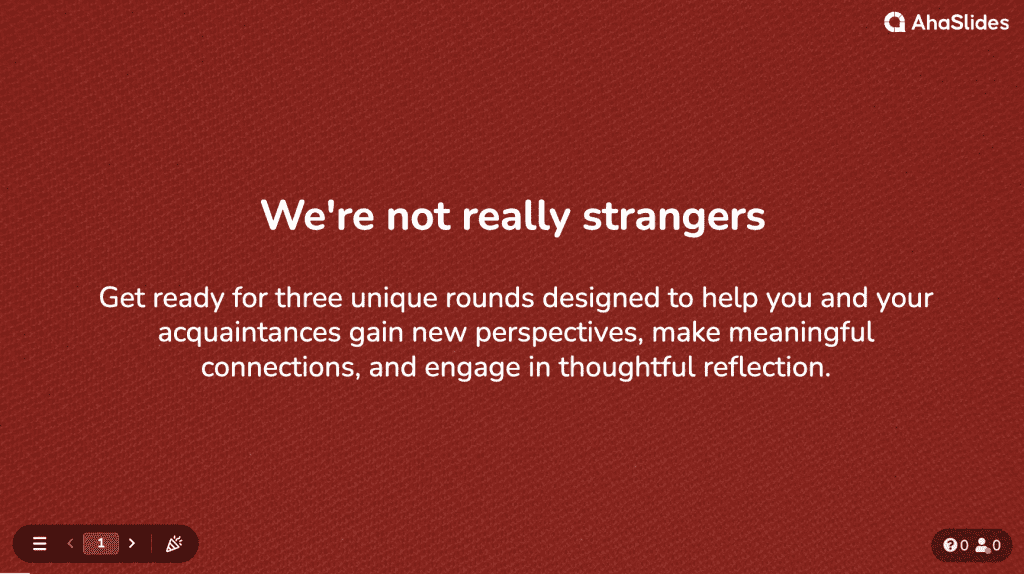
- # 1: Tẹ lori awọn bọtini loke lati da awọn ere. O le lọ kiri nipasẹ ifaworanhan kọọkan ki o fi awọn imọran silẹ lori rẹ pẹlu awọn ọrẹ.
- #2: Lati ṣafipamọ awọn ifaworanhan tabi mu ṣiṣẹ pẹlu awọn ojulumọ ni ikọkọ, tẹ 'Akọọlẹ Mi,' lẹhinna forukọsilẹ fun akọọlẹ AhaSlides ọfẹ kan. O le ṣe wọn siwaju ati mu wọn ṣiṣẹ lori ayelujara / offline pẹlu eniyan bi o ṣe fẹ!
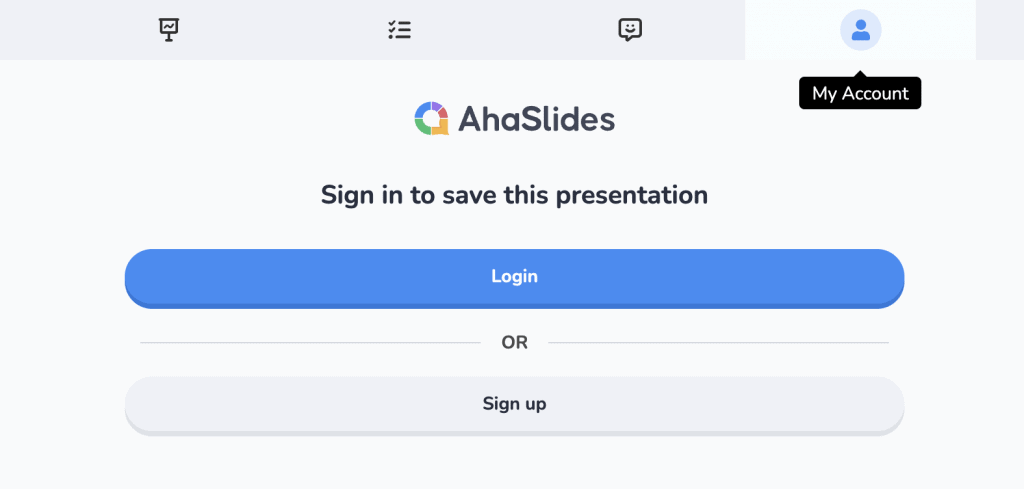
Atokọ ni kikun ti “A kii ṣe Alejò Nitootọ” Awọn ibeere (Imudojuiwọn 2025)
Jẹ ká to bẹrẹ pẹlu awọn Egbò to jin A ba ko gan alejò ibeere. Iwọ ati awọn ojulumọ rẹ yoo ni iriri awọn iyipo pataki mẹta ti n ṣiṣẹ awọn idi oriṣiriṣi: iwoye, asopọ, ati iṣaro.
Ipele 1: Iro
Ipele yii da lori iṣaro-ara ẹni ati agbọye awọn ero ati awọn ikunsinu ti ara ẹni. Nipa pinpin awọn iwoye, awọn olukopa ni oye si bi awọn miiran ṣe rii wọn. Wọn mọ ti awọn idajọ imolara ati itara diẹ sii nipasẹ agbọye awọn lẹnsi miiran.
Eyi ni diẹ ninu awọn ibeere yinyin ti o dara julọ fun itọkasi rẹ:
1/ Kini o ro pe pataki mi jẹ?
2/ Ṣe o ro pe mo ti ni ife?
3/ Ṣe o ro pe Mo ti sọ ọkan mi bajẹ?
4/ Ṣe o ro pe a ti yọ mi kuro?
5/ Ṣe o ro pe mo jẹ olokiki ni ile-iwe giga?
6/ Kini o ro pe Emi yoo fẹ? Awọn Cheetos gbona tabi awọn oruka alubosa?
7/ Ṣe o ro pe mo fẹran jijẹ ọdunkun ijoko?
8/ Ṣe o ro pe emi ni extrovert?
9/ Ṣe o ro pe mo ni arakunrin kan? Agbalagba tabi kékeré?
10/ Nibo ni o ro pe mo dagba?
11/ Ṣe o ro pe Mo n ṣe ounjẹ ni akọkọ tabi gbigba gbigba?
12/ Kini o ro pe mo ti n wo binge-laipe?
13/ Ṣe o ro pe mo korira ijidide ni kutukutu?
14/ Kini ohun ti o dara julọ ti o le ranti ṣe fun ọrẹ kan?
15/ Iru ipo awujọ wo ni o jẹ ki o lero pupọ julọ?
16/ Tani o ro pe o jẹ oriṣa ayanfẹ mi?
17/ Nigba wo ni MO maa n jẹ ounjẹ alẹ?
18/ Ṣe o ro pe mo fẹran wọ pupa?
19/ Kini o ro pe o jẹ ounjẹ ti o fẹran mi?
20/ Ṣe o ro pe mo wa ninu aye Giriki?
21/ Ṣe o mọ kini iṣẹ ala mi jẹ?
22/ Ṣe o mọ ibiti isinmi ala mi wa?
23/ Ṣe o ro pe mo ti wa ni ipanilaya ni ile-iwe?
24/ Ṣe o ro pe emi li a soro eniyan?
25/ Ṣe o ro pe emi jẹ ẹja tutu?
26/ Kini o ro pe ohun mimu Starbucks ayanfẹ mi jẹ?
27/ Ṣe o ro pe Mo nifẹ kika awọn iwe?
28/ Nigba wo ni o ro pe Mo fẹran pupọ julọ lati duro nikan?
29/ Apa ile wo ni o ro pe o jẹ aaye ayanfẹ mi?
30/ Ṣe o ro pe Mo fẹran awọn ere fidio bi?
Ipele 2: Asopọmọra
Ni ipele yii, awọn oṣere n beere awọn ibeere ti o ni ironu si ara wọn, ni idagbasoke asopọ ti o jinlẹ ati itara.
Ailagbara jẹ bọtini nibi. Imọye ti igbẹkẹle ati ibaramu nigbagbogbo wa lati ṣiṣi-si oke ati pinpin tootọ ti awọn iriri ti ara ẹni. Ailagbara lẹhinna fọ ibaraẹnisọrọ ipele-dada ati mu awọn ibatan lagbara. Ati pe nibi ni awọn ibeere gbọdọ-beere fun awọn iwe ifowopamosi ti o jinlẹ:
31/ Bawo ni o ṣe le ro pe Emi yoo yi iṣẹ mi pada?
32/ Kini oju akọkọ rẹ si mi?
33/ Kini ohun ti o kẹhin ti o purọ nipa?
34/ Kini o ti n fi ara pamọ ni gbogbo ọdun wọnni?
35/ Kini ero inu rẹ ti o buruju?
36/ Kini ohun ikẹhin ti o parọ fun iya rẹ nipa?
37/ Kini aṣiṣe nla ti o ti ṣe?
38/ Kini irora ti o buru ju ti o ti wa ninu rẹ ri?
39/ Kini o tun n gbiyanju lati fi ara rẹ han?
40/ Kini iru eniyan rẹ ti o tumọ julọ?
41/ Kini apakan ti o nira julọ nipa ibaṣepọ rẹ?
42/ Kini ohun ti o dara julọ nipa baba tabi iya rẹ?
43/ Kini orin ayanfẹ ti o ko le da ironu rẹ duro ni ori rẹ?
44/ Ṣe o purọ fun ara rẹ nipa ohunkohun?
45/ Eranko wo ni o fe gbin?
46/ Kini yoo lero ti o dara julọ lati gba ni kikun ni ipo lọwọlọwọ yii?
47/ Nigbawo ni akoko ikẹhin ti o ni orire lati jẹ ọ?
48/ Kini ajẹtífù ti o ṣe apejuwe rẹ julọ ni igba atijọ ati ni bayi?
49/ Kí ni àbúrò rẹ kò ní gbàgbọ́ nípa ìgbésí ayé rẹ lónìí?
50/ Apa wo ninu idile rẹ ti o fẹ lati tọju tabi jẹ ki o lọ?
51/ Kini iranti ayanfẹ rẹ lati igba ewe rẹ?
52/ Bawo ni o ṣe pẹ to lati jẹ ọrẹ pẹlu rẹ?
53/ Kini o gba ẹnikan lati ọdọ ọrẹ si ọrẹ to dara julọ fun ọ?
54/ Ibeere wo ni o n gbiyanju lati dahun ninu aye re ni bayi?
55/ Kí ni o máa sọ fún àbúrò rẹ?
56/ Kini iṣe rẹ ti o kabamọ julọ?
57/ Nigbawo ni igba ikẹhin ti o kigbe?
58/ Kini o dara ju ọpọlọpọ eniyan ti o mọ lọ?
59/ Tani o fẹ lati ba sọrọ nigbati o ba ni imọlara adawa?
60/ Kini apakan ti o nira julọ lati wa ni okeere?
Ipele 3: Iṣaro
Ipele ikẹhin ṣe iwuri fun awọn oṣere lati ronu lori iriri ati awọn oye ti o gba lakoko ere naa. O jẹ nipa agbọye ararẹ ati awọn miiran dara julọ, bii bii rilara wọn tabi ṣe ajọṣepọ pẹlu awọn miiran. Ni awọn ọrọ miiran, awọn ibeere wọnyi tẹ sinu oye ẹdun nipa itara ati imọ-ara-ẹni. Jubẹlọ, rẹ otito ilana yoo fi kan ori ti bíbo ati wípé.
Bayi, ṣayẹwo diẹ ninu awọn ibeere ifarabalẹ ara-ẹni WNRS ni atẹle:
61/ Kini o fẹ yipada ninu iwa rẹ ni bayi?
62/ Tani o fẹ lati sọ ma binu tabi dupẹ pupọ julọ?
63/ Ti o ba ṣe akojọ orin kan fun mi, awọn orin 5 wo ni yoo wa lori rẹ?
64/ Ohun ti nipa mi yà ọ?
65/ Kini o ro pe alagbara mi jẹ?
66/ Ṣe o ro a ni diẹ ninu awọn afijq tabi iyato?
67/ Tani o ro pe o le jẹ alabaṣepọ mi ọtun?
68/ Kini MO nilo lati ka ni kete ti mo ba ni akoko?
69/ Nibo ni MO ti kun julọ lati fun imọran?
70/ Kini o ko nipa ara re nigba ti ndun yi game?
71/ Ibeere wo ni o bẹru julọ lati dahun?
72/ Kilode ti "sorority" tun ṣe pataki si igbesi aye kọlẹẹjì
73/ Kini yoo jẹ ẹbun pipe fun mi?
74/ Apa ara re wo ni o ri ninu mi?
75/ Da lori ohun ti o kọ nipa mi, kini iwọ yoo daba pe Emi yoo ka?
76/ Kini iwọ yoo ranti nipa mi nigbati a ko ba si olubasọrọ mọ?
77/ Lati ohun ti Mo ti gbọ nipa mi, kini fiimu Netflix ṣeduro mi lati wo?
78/ Kini MO le ran ọ lọwọ?
79/ Bawo ni Sigma Kappa ṣe tẹsiwaju lati ni ipa lori igbesi aye rẹ?
80/ Njẹ o le farada ẹnikan ti o ti ṣe ipalara fun ọ)?
81/ Kini MO nilo lati gbọ ni bayi?
82/ Ṣe iwọ yoo gbiyanju lati ṣe nkan kan ni agbegbe itunu rẹ ni ọsẹ ti n bọ?
83/ Ṣe o ro pe awọn eniyan wa sinu aye rẹ fun idi kan?
84/ Kilode ti o ro pe a pade?
85/ Kini o ro pe mo bẹru julọ?
86/ Kini ẹkọ ti iwọ yoo gba kuro ninu iwiregbe rẹ?
87/ Kini o daba pe ki n jẹ ki o lọ?
88/ Gba nkankan
89/ Emi nko ti o ko ye o?
90/ Bawo ni iwọ yoo ṣe ṣe apejuwe mi si alejò?
afikun igbadun: Wildcards
Apakan yii ni ero lati jẹ ki ere ibeere naa ni iwunilori ati ikopa. Dipo ki o beere awọn ibeere, o jẹ iru ilana iṣe ti awọn oṣere ti o fa ni lati pari. Eyi ni 10:
91/ Ya aworan papọ (60 iṣẹju-aaya)
92/ Sọ itan kan papọ (iṣẹju 1)
93/ Kọ ifiranṣẹ si kọọkan miiran ki o si fun kọọkan miiran. Ṣi i ni kete ti o ba ti lọ.
94/ Ya selfie papọ
95/ Ṣẹda ibeere ti ara rẹ lori ohunkohun. Jẹ ki o ka!
96/ Wo oju ara wa fun ọgbọn aaya. Kini o ṣe akiyesi?
97/ Fi aworan rẹ han nigbati o jẹ ọmọde (ni ihoho)
98/ Kọ orin ayanfẹ
99/ Sọ fun ẹnikeji lati pa oju wọn mọ ki o si pa wọn mọ (duro fun iṣẹju-aaya 15 ki o fi ẹnu ko wọn)
100/ Kọ akọsilẹ si awọn ọdọ rẹ. Lẹhin iṣẹju 1, ṣii ki o ṣe afiwe.
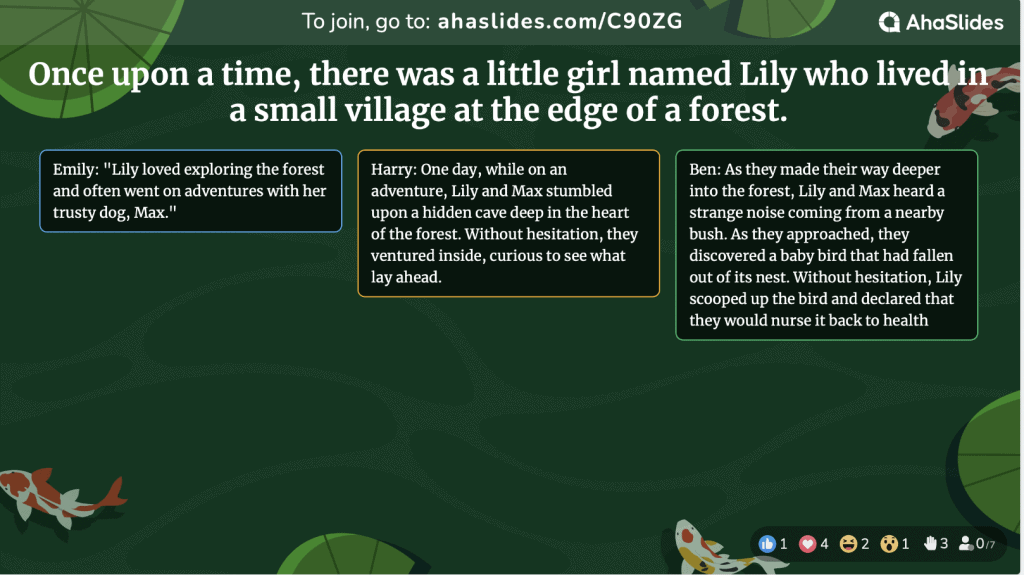
Special Edition & Imugboroosi akopọ
Nilo diẹ sii A kii ṣe awọn ibeere alejò gaan? Eyi ni diẹ ninu awọn ibeere afikun ti o le beere ni awọn ibatan oriṣiriṣi, lati ibaṣepọ, ifẹ ti ara ẹni, ọrẹ, ati ẹbi si aaye iṣẹ.
10 A kii ṣe Alejò Awọn ibeere - Atẹjade Awọn tọkọtaya
101/ Kini o ro pe yoo jẹ pipe fun igbeyawo rẹ?
102/ Kini yoo jẹ ki o lero sunmọ mi?
103/ Njẹ akoko eyikeyi wa ti o fẹ fi mi silẹ?
104/ Omo melo ni o fe?
105/ Kini a le ṣẹda papọ?
106/ Ṣe o ro pe emi tun jẹ wundia bi?
107/ Kini agbara ti o wuni julọ nipa mi ti kii ṣe ti ara?
108/ Kini itan nipa rẹ ti emi ko le padanu?
109/ Kini o ro pe alẹ ọjọ pipe mi yoo jẹ?
110/ Ṣe o ro pe emi ko ti ni a ibasepo?
10 A kii ṣe Alejò Awọn ibeere - Atẹjade Ọrẹ
111/ Kini o ro pe ailera mi jẹ?
112/ Kini o ro pe agbara mi jẹ?
113/ Kini o ro pe o yẹ ki n mọ nipa ara mi pe boya Mo mọ?
114/ Báwo ni àkópọ̀ ìwà wa ṣe ń kún ara wa?
115/ Kini o nifẹ julọ nipa mi?
116/ Ni ọrọ kan, ṣe apejuwe bi o ṣe rilara ni bayi!
117/ Idahun temi wo lo mu o tan?
118/ Ṣe Mo le gbẹkẹle ọ lati sọ nkan ikọkọ?
119/ Kini o n ro ni bayi?
120/ Ṣe o ro pe emi jẹ ifẹnukonu to dara?
10 A kii ṣe Alejò Nitootọ Awọn ibeere - Atẹjade ibi iṣẹ
121/ Kí ni iṣẹ́ àṣeyọrí kan tí o fi ń yangàn jùlọ, kí sì nìdí?
122/ Pin akoko kan nigbati o dojuko ipenija pataki ni iṣẹ ati bii o ṣe bori rẹ.
123/ Kini ogbon tabi agbara ti o ni ti o lero pe a ko lo ninu ipa rẹ lọwọlọwọ?
124/ Ti o ba ronu lori iṣẹ rẹ, kini o jẹ ẹkọ ti o niyelori julọ ti o ti kọ titi di isisiyi?
125/ Ṣe apejuwe ibi-afẹde ti o jọmọ iṣẹ tabi ireti ti o ni fun ọjọ iwaju.
126/ Pin olutojueni tabi alabaṣiṣẹpọ ti o ti ni ipa pataki lori idagbasoke ọjọgbọn rẹ, ati idi.
127/ Bawo ni o ṣe mu iwọntunwọnsi igbesi aye iṣẹ ati ṣetọju alafia ni agbegbe iṣẹ ti o nbeere?
128/ Kini ohun kan ti o gbagbọ pe awọn ẹlẹgbẹ rẹ tabi awọn ẹlẹgbẹ rẹ ko mọ nipa rẹ?
129/ Ṣapejuwe akoko kan nigbati o ni imọlara ti iṣiṣẹpọpọ tabi ifowosowopo ni aaye iṣẹ rẹ.
130/ Ti o ronu lori iṣẹ rẹ lọwọlọwọ, kini abala ti o ni ere julọ ti iṣẹ rẹ?
10 A kii ṣe Alejò Nitootọ Awọn ibeere - Ẹda idile
131/ Kini inu rẹ dun julọ loni?
132/ Kini igbadun julọ ti o ti ni?
133/ Kini itan ibanujẹ ti o ti gbọ lailai?
134/ Kini o fẹ sọ fun mi fun igba pipẹ?
135/ Kini o gba to gun lati sọ otitọ fun mi?
136/ Ṣe o ro pe emi ni eniyan ti o le sọrọ si?
137/ Awọn iṣẹ wo ni o fẹ lati ṣe pẹlu mi?
138/ Kini ohun ti ko ṣe alaye julọ ti o ṣẹlẹ si ọ?
139/ Kini ojo re?
140/ Nigba wo ni o ro pe o jẹ akoko ti o dara julọ lati sọrọ nipa ohun ti o ṣẹlẹ si ọ?
Science sile awọn ere: Kí nìdí WNRS Works
O kan dekini awọn ibeere, kini aṣeyọri ti A kii ṣe Awọn ajeji Awọn ibeere ni ẹhin? Nipasẹ apẹrẹ imomose, awọn ilana imọ-ọkan, tabi awọn miiran? Jẹ ki ká yi lọ si isalẹ fun a wo awọn Imọ sile awọn ere!
Agbara ti Béèrè Awọn ibeere Ti o tọ
Dipo ti idojukọ lori gbigba awọn idahun nikan, ere WNRS ṣe apẹrẹ awọn ibeere ti o ni ironu fun wiwa ara ẹni, oye ara ẹni, ati awọn akoko iyipada igbesi aye. Lati awọn ibeere icebreaker si awọn ibeere introspective, ere naa n funni ni rilara ailewu fun awọn oṣere lati ṣii ni kutukutu ki o ṣe ajọṣepọ pẹlu awọn miiran.
Bawo ni Ibanujẹ Imolara Ṣe Awọn asopọ Ni okun sii
Ipalara jẹ ipilẹ ti ibaramu ẹdun. Didapọ mọ ere WNRS gba awọn oṣere laaye lati pin, kọ ẹkọ pẹlu awọn miiran, ati kọ ara wọn. Ni ọna yii, wọn ṣe afihan igbẹkẹle, ṣe deede ẹdun, ati tọju itara fun kikọ awọn isopọ to lagbara.
Àkóbá Anfani ti awọn ere
Yato si imudara awọn iwe ifowopamosi ti o lagbara, WNRS ni ọpọlọpọ ilera ọpọlọ ati awọn anfani imọ-ọkan, gẹgẹbi imudarasi Imọye Imọlara (EQ), itusilẹ awọn idena awujọ, iderun wahala, ati idagbasoke ti ara ẹni.
Ṣeun si awọn ibeere ifarabalẹ, o le mu imọ-ara ati itara pọ si, eyiti o jẹ awọn eroja pataki ni EQ. Pẹlupẹlu, otitọ, agbegbe ailewu, ati awọn asopọ ti o dara ṣere bi idakọri ọkan lati dinku aapọn ati aibalẹ awujọ.
Yato si, awọn itara ifarabalẹ le jẹ awọn akoko iyipada-aye lati ṣawari ararẹ daradara fun oye ti ara ẹni ti o jinlẹ ati idagbasoke ti ara ẹni.
Holt-Lunstad J. Asopọmọra Awujọ gẹgẹbi ifosiwewe pataki fun ilera opolo ati ti ara: ẹri, awọn aṣa, awọn italaya, ati awọn ilolu ọjọ iwaju. Agbaye Psychiatry. 2024 Oṣu Kẹwa; 23 (3): 312-332. doi: 10.1002/wps.21224. PMID: 39279411; PMCID: PMC11403199.
Ṣe akanṣe “A kii ṣe Alejò Nitootọ” fun Awọn iwulo Rẹ
Eyi ni bii o ṣe le ṣe ere WNRS tirẹ nitootọ!
Ṣiṣẹda Awọn ibeere Tirẹ Rẹ
Ṣaaju ki o to telo awọn ibeere, beere ara rẹ, "Iru awọn isopọ wo ni mo fẹ lati bolomo?". Da lori awọn ibatan tabi awọn iṣẹlẹ kan pato, iwọ yoo ṣe iṣẹ ọwọ awọn ibeere ti o yẹ ni ibamu.
Pẹlupẹlu, gba itọkasi lati awọn atẹjade afikun ati awọn akori fun awọn imọran diẹ sii lati ṣe awọn ibeere to tọ. Maṣe gbagbe lati lo Wildcard ati awọn itọka tabi awọn agbasọ ọrọ lati jẹ ki ere naa jẹ ki o ni itumọ.
Awọn ere Yiyan pẹlu Awọn imọran Iru
Nifẹ awọn A kii ṣe awọn ibeere Alejò nitootọ ṣugbọn ifẹ lati ṣawari diẹ sii; Ni isalẹ wa diẹ ninu awọn yiyan nla pẹlu awọn imọran ti o jọra:
- Awọn koko-ọrọ tabili: A ere ti ibaraẹnisọrọ awọn ibẹrẹ pẹlu orisirisi awọn ibeere fun icebreakers to jin iweyinpada. Awọn imọran fun awọn ounjẹ ẹbi tabi awọn apejọ gbogbogbo.
- BigTalkEre yii fo awọn ibeere fun ọrọ kekere ati wakọ taara sinu jinlẹ ati ibaraẹnisọrọ to nilari.
- Jẹ ká jinNi akọkọ fun awọn tọkọtaya lati ṣere pẹlu awọn ibeere ipele-3: Icebreaker, Jin, ati Jin. Sibẹsibẹ, o le jẹ iyipada fun awọn alabaṣepọ miiran lati ṣere.
Dapọ pẹlu Awọn ibẹrẹ ibaraẹnisọrọ miiran
Fun iriri diẹ sii ti o ni agbara ati ikopa, o le dapọ A Kii ṣe Awọn ibeere Alejò Nitootọ pẹlu awọn ibẹrẹ iyipada miiran.
O le darapọ awọn itọsi lati awọn ere miiran lati ṣe oniruuru awọn ibeere. Bibẹẹkọ, so ere WNRS pọ pẹlu awọn iṣe bii iyaworan, iwe akọọlẹ, tabi awọn alẹ fiimu lati gba gbogbo eniyan lori akori kanna. Ni pataki, o le ṣepọ ohun elo A kii ṣe Alejò Nitootọ tabi ẹda oni-nọmba pẹlu awọn kaadi ti ara fun awọn ẹya ibaraenisepo diẹ sii ati awọn itọsọna tuntun.
Atẹjade & Awọn ẹya PDF ti Awọn ibeere WNRS (Igbasilẹ Ọfẹ)
A kii ṣe Alejò Nitootọ (WNRS) nfunni ni awọn PDF ti o ṣe igbasilẹ ọfẹ ti awọn ẹda oni-nọmba wọn nikan lori oju opo wẹẹbu osise wọn. Awọn atẹjade lọpọlọpọ lo wa lati ṣaajo si awọn iwulo alailẹgbẹ rẹ, bii Pack Iwadii-ara-ẹni, Pada si Ẹya Ile-iwe, Iwe akọọlẹ Introspective, ati diẹ sii.
Ṣe igbasilẹ awọn ibeere ọfẹ A kii ṣe Alejò Nitootọ ni ẹya PDF Nibi!
Lati ṣe awọn kaadi DIY WNRS tirẹ, o le tẹ awọn PDF ọfẹ wọnyi ki o ge wọn sinu awọn kaadi kọọkan. Ni omiiran, o le ṣẹda awọn ibeere ti o ni atilẹyin nipasẹ ọna kika WNRS ki o tẹ wọn si ori kaadi kaadi.
Nigbagbogbo bi Ìbéèrè
Kini kaadi kẹhin ni A kii ṣe alejò gaan?
Kaadi ipari ti ere kaadi A kii ṣe Awọn ajeji gan-an nilo ki o kọ akọsilẹ kan si alabaṣepọ rẹ ki o ṣii nikan ni kete ti o ba ti pinya.
Kini yiyan ti a ko ba jẹ alejò gaan?
O le mu diẹ ninu awọn ere ibeere bii Ma Emi lailai ni, 2 Awọn otitọ ati Irọ 1, Ṣe iwọ yoo kuku, Eyi tabi iyẹn, Tani Emi…
jo
- Holt-Lunstad J. Asopọmọra Awujọ gẹgẹbi ifosiwewe pataki fun ilera opolo ati ti ara: ẹri, awọn aṣa, awọn italaya, ati awọn ilolu ọjọ iwaju. Agbaye Psychiatry. 2024 Oṣu Kẹwa; 23 (3): 312-332. doi: 10.1002/wps.21224. PMID: 39279411; PMCID: PMC11403199. https://www.ncbi.nlm.nih.gov/books/NBK64939/
- IU iroyin. Awọn nẹtiwọọki awujọ ti o lagbara lati koju ilera ọpọlọ ni ọdọ awọn ọdọ, iwadii wiwa. https://news.iu.edu/live/news/33803-stronger-social-networks-key-to-addressing-mental.

